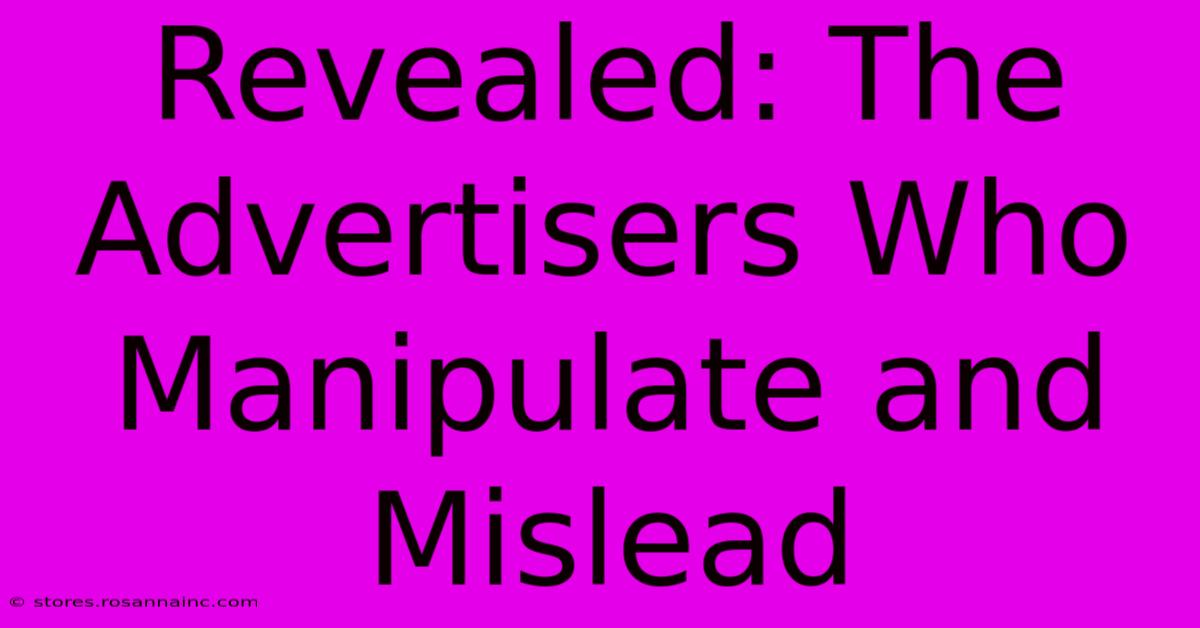Revealed: The Advertisers Who Manipulate And Mislead

Table of Contents
Revealed: The Advertisers Who Manipulate and Mislead
We're bombarded with ads daily. But how many of us stop to question the ethics behind the flashy visuals and compelling narratives? This article dives deep into the deceptive tactics some advertisers employ, revealing the manipulative strategies used to sway our purchasing decisions. We'll examine common misleading advertising techniques, explore the legal and ethical implications, and offer advice on how to become a more discerning consumer.
The Sneaky World of Misleading Advertising
Many advertisers operate within a grey area, pushing the boundaries of what's acceptable. While outright lies are illegal, subtle manipulations are often used to create a false impression. These include:
-
Bait and Switch: This classic tactic lures customers in with a low price or enticing offer, only to reveal that the product is unavailable or to pressure them into purchasing a more expensive alternative.
-
Exaggerated Claims: Hyperbole is common, but claims that are demonstrably false or lack substantial evidence constitute misleading advertising. This includes puffery that goes beyond simple boasting and makes specific, unsubstantiated claims about product efficacy or quality.
-
Hidden Fees: Many companies bury essential charges in the fine print, leading to unexpected costs for consumers. This is particularly prevalent in subscription services and travel bookings.
-
Misleading Visuals: Images and videos can be heavily edited or staged to create a false sense of reality. Think of before-and-after photos that have been heavily retouched or videos that selectively highlight only the positive aspects of a product.
-
Vague Language: Ambiguous terms and phrases allow advertisers to avoid making specific claims that could be easily disproven. Words like "up to," "as seen on TV," and "virtually," can be misleading if not properly defined.
-
Fake Reviews and Testimonials: The proliferation of fake online reviews is a significant problem. These fake endorsements inflate a product's perceived popularity and trustworthiness.
The Legal Ramifications and Ethical Considerations
Misleading advertising isn't just unethical; it's often illegal. Advertising standards authorities and consumer protection agencies actively monitor advertising practices and take action against businesses that violate the law. Penalties can include fines, cease-and-desist orders, and even criminal charges in severe cases.
Beyond the legal aspects, ethical concerns arise from the manipulative nature of misleading advertising. Such practices erode consumer trust, exploit vulnerabilities, and can have far-reaching consequences for public health and well-being. For example, misleading advertising of health and beauty products can lead to consumers making unsafe or ineffective choices.
How to Spot and Avoid Misleading Ads
Becoming a savvy consumer requires vigilance and a healthy dose of skepticism. Here are some tips to help you identify and avoid misleading ads:
-
Read the Fine Print: Don't just skim the surface; carefully read the terms and conditions, disclaimers, and small print before making a purchase.
-
Compare Prices and Products: Don't rely solely on a single advertisement. Research alternative products and compare prices from different sources.
-
Check for Independent Reviews: Look for reviews from reputable sources, such as independent consumer organizations or professional review sites. Be wary of overly positive reviews with suspiciously similar wording.
-
Be Skeptical of Extraordinary Claims: If something sounds too good to be true, it probably is. Don't fall for promises that seem unrealistic or unsupported by evidence.
-
Report Suspicious Advertising: If you believe you've encountered misleading advertising, report it to the relevant consumer protection agency or advertising standards authority.
Conclusion:
The world of advertising is complex and often deceptive. By understanding the common tactics employed by misleading advertisers and employing critical thinking skills, you can better protect yourself and contribute to a marketplace where honesty and transparency prevail. Consumers have a powerful voice; by staying informed and reporting deceptive practices, we can create a more ethical and responsible advertising landscape.

Thank you for visiting our website wich cover about Revealed: The Advertisers Who Manipulate And Mislead. We hope the information provided has been useful to you. Feel free to contact us if you have any questions or need further assistance. See you next time and dont miss to bookmark.
Featured Posts
-
Transform Your Desk Into A Construction Site The Portable Architects Toolkit Builder In A Bottle
Feb 05, 2025
-
The Shocking Truth About Medical Bills Texas Edition
Feb 05, 2025
-
Discover The Game Changer For Your Email Marketing Wise Stamp Pro Code
Feb 05, 2025
-
Appreciation Amplified Your Express Reply Ignites Gratitude Undefined
Feb 05, 2025
-
Installation Simplified The Beginners Guide To Smooth Installations
Feb 05, 2025
